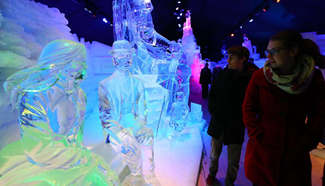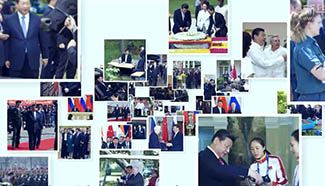by Osama Radi, Omar Othmani
GAZA, Dec. 30 (Xinhua) -- Gifts, trees and lights for the celebration of Christmas and the New Year were heavily decorating the storefronts of Gaza city's main street in the hope of attracting customers and increasing sales to flourish the sluggish economy in the impoverished Hamas-ruled Gaza Strip.
Storekeepers along Omer al-Mukhtar avenue in Gaza city center displayed their goods and gifts to exploit the occasion in a bid to compensate a sharp economic recession that the coastal enclave has been experiencing since Hamas took control of the territory in 2007.
Storefronts had been topped with gifts that focused on a variety of forms such as Santa Claus and his famous wagon, as well as sponge-made big red hearts that read "Happy New Year." Such a scene is rare in a conservative society like Gaza, dominated by Islamic thoughts that see such a phenomena a taboo.
Mohamed Ajour, a Gaza storekeeper, told Xinhua that the New Year occasion is considered for him and other vendors "as a very important event that attract customers to buy gifts and consequently this may help flourish the weak trade movement in the entire Gaza Strip."
The gifts that are mostly sold to customers are those related to the holiday season such as Santa Claus costumes and red hats as well as the sculptures used for congratulating the new year. A large lighted Christmas tree has been placed outside Ajour's store, where customers stop for taking pictures.
Ibrahim Farajj, a local Gaza photographer, told Xinhua that pilling the storefronts with such beautiful gifts and lights "is not only helping attract customers to buy, but also it allows them to document this annual event, which is receiving the new year with hope that it will be better next year."
"Taking photos of individuals or families in the market and in the main street of Gaza City, mainly near the Christmas tree, or wearing the red hats of Santa Claus and his costumes, was quite popular among the customers," said Farajj.
Other stores in Gaza, which sell garments, perfumes, accessories and cosmetics, take advantage of the holiday season to show their goods and products. The red color is the color that dominates most of the stores in the Gaza Strip.
Restaurants and hotels in Gaza city, most of them are located along the seaside, declared a variety of activities for their customers, such as parties before midnight of the New Year. In the previous years, Hamas security forces and police used to ban any celebratory events.
However, the thing which is odd and strange is that the Hamas-run Ministry of Interior told those who are planning New Year celebrations in their restaurants, cafés and hotels that they can celebrate only on Dec. 30, instead of Dec. 31, according to Gaza restaurants owners.
"The Interior Ministry told us that it decided to allow us to celebrate on Dec. 30 because celebrating the New Year on Dec. 31 is a western phenomena that completely contradicts with Islamic rules and Islamic philosophy," Salah Abu Hassira, chairman of Restaurants Union in Gaza city, told Xinhua.
He went on saying that "the restaurants and hotels in the Gaza Strip will abide by the decision of the Interior Ministry and will do the New Year celebration on Dec. 30 instead of Dec. 31."
Abu Hassira also said that hotels and restaurants are using the season to help flourish the economy, which has deteriorated and been broken due to around 10 years of an Israeli tight blockade, which was imposed on the Gaza Strip right after Hamas seized control of it.
"Preventing parties and celebrations on the New Year's Eve is certainly damaging our business," he said, adding "the whole world is celebrating the New Year's Eve, and the ban in Gaza would double our suffering and keep our business deteriorating."
In the Gaza Strip, there are 109 touristic establishments, including restaurants, hotels, resorts and cafes. Abu Hassira said that the annual loss in the sector of tourism in the Gaza Strip climbed to 6 million U.S. dollars, due to the Israeli blockade and due to Hamas restrictions.
Various rights groups in the Gaza Strip usually slam Hamas policy for preventing people in the enclave to celebrate joyful occasions. The groups said in various statements that such a policy would increase despair and depression among the population.










